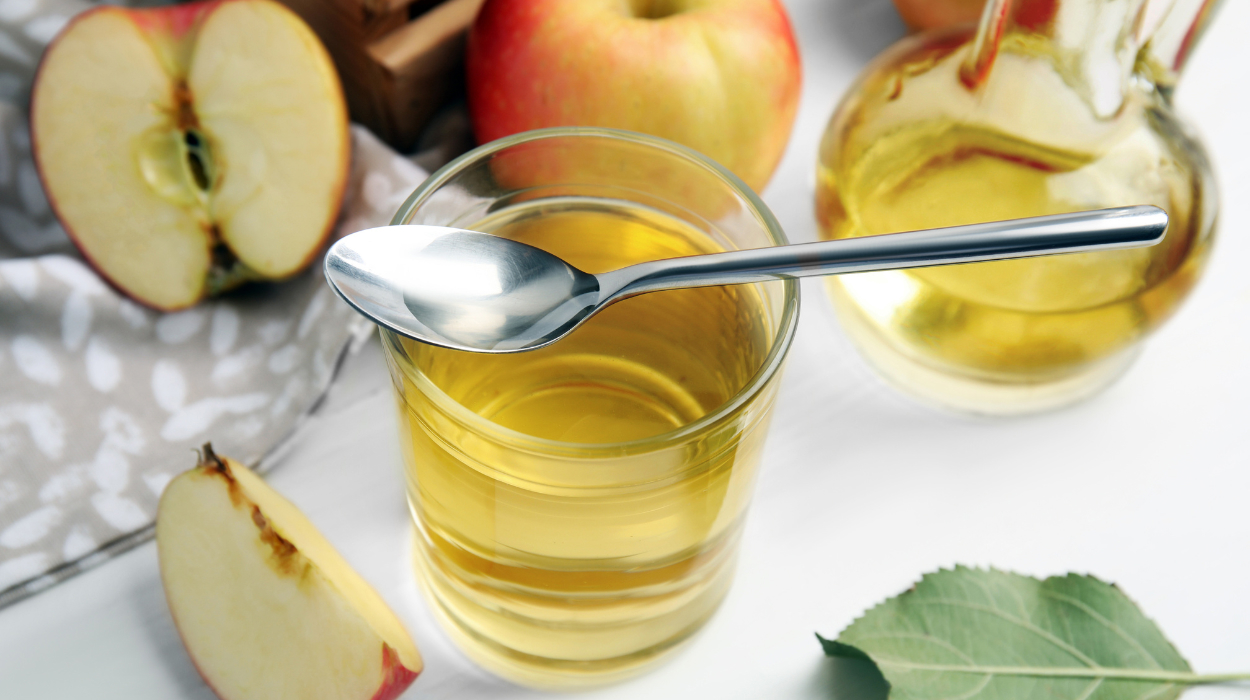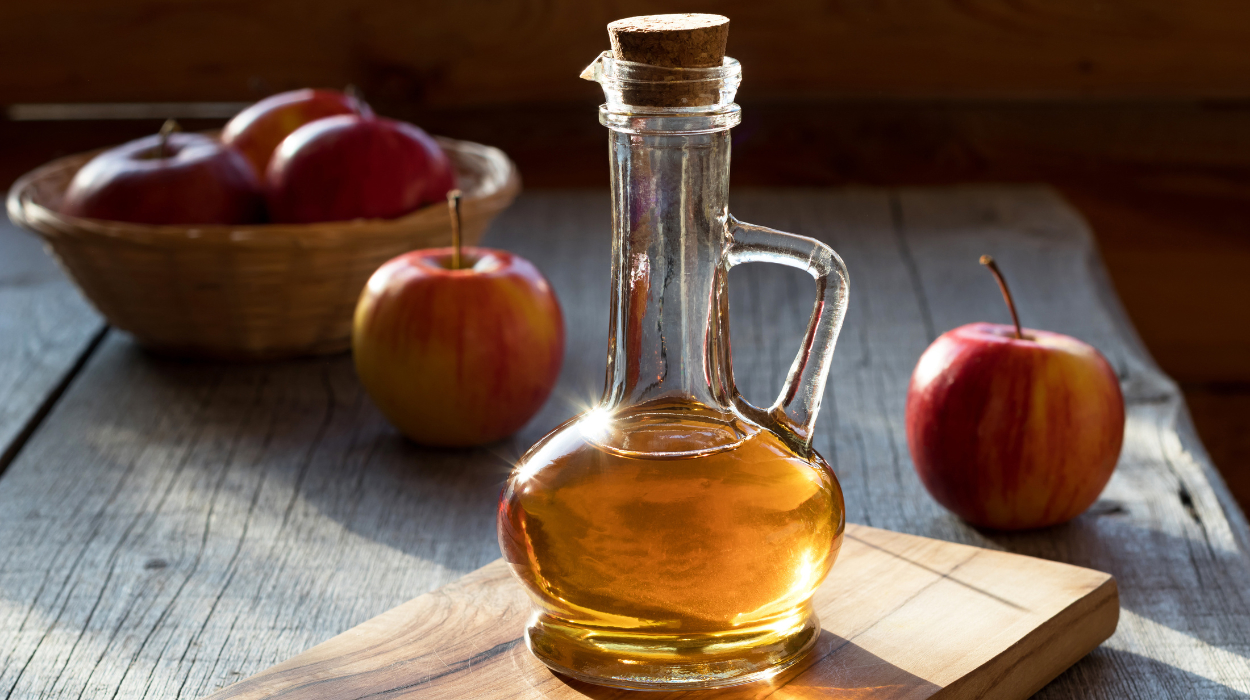Apple cider vinegar[1] is a vinegar made from fermented apple juice and has numerous health benefits. It can help boost weight loss, regulate blood sugar levels, and improve skin health. But you may wonder how much apple cider vinegar a day suits your health.
However, always consider the risks or side effects of drinking apple cider vinegar. Diluted apple cider vinegar is best to prevent throat burns, chemical burns, stomach pain, and tooth enamel erosion.
Read on and learn how much apple cider vinegar to drink to enjoy the best benefits. We also cover the risk factors and safety tips.
How Much Apple Cider Vinegar Should You Drink A Day?
You should take one to two teaspoons to enjoy the health benefits of apple cider vinegar at home. Ensure you dilute ACV to prevent side effects such as throat burns.
How Much Apple Cider Vinegar A Day

Knowing your reason for consuming it is the best guiding factor for how much apple cider vinegar per day to add to a glass of water.
One reason people drink apple cider vinegar is to lose weight.[2] Evidence shows that apple cider vinegar can aid weight loss alongside a calorie deficit. So, consider taking diluted apple cider vinegar for weight loss.
Animal studies suggest consuming ACV can also help regulate blood sugar levels.[3]
No matter the reason, it’s important to get the dosage correct. Consuming one to two teaspoons[4] of apple cider vinegar daily is recommended. However, we need more research to understand the effects of long-term consumption.
Always combine apple cider vinegar with water or recipes such as sauces before consuming. If drinking, try adding honey to sweeten the beverage. Avoid apple cider vinegar shots as the acidity may cause side effects — more on that later.
Best Time To Drink Apple Cider Vinegar
Some people swear drinking apple cider vinegar in the morning on an empty stomach is the magic answer. Others say it’s better to take a glass of water mixed with apple cider vinegar right before bed to aid digestion at night.
Frankly, no scientific evidence details the best time to drink apple cider vinegar. So, you can take it in the morning, during the day, or at night before you head to bed. But ensure you stick to the right apple cider vinegar dosage to be safe.
Apple Cider Vinegar Benefits

Below, we look at some benefits of apple cider vinegar worth considering if you wonder, ‘How much ACV should I drink a day?’
Weight Loss
Losing weight is many people’s goal. If you’ve searched the internet for the best ways to eliminate body fat, you might’ve seen recommendations for using apple cider vinegar.
Yes, apple cider vinegar may help you lose fat. Evidence from animal studies on rats fed a high-fat diet suggests that drinking apple cider vinegar might help reduce weight and appetite.[5]
Weight gain is evident when you consume more calories daily. This study suggests that drinking apple cider vinegar increases satiety, helping to deter additional body fat. However, there’s not enough research to know whether these results can be translated to humans.
Lower Blood Sugar Levels
Drinking apple cider vinegar may contribute to lowering blood sugar levels, which is good news for people with diabetes.
Insulin resistance,[6] as seen in type 2 diabetes, can cause issues with blood sugar balance. The good news is apple cider vinegar might help improve insulin sensitivity. That way, your body can transfer more glucose into your bloodstream and cells.
Studies show that a daily dose of 20 ml of apple cider vinegar may reduce fasting blood sugar levels[7] and slow down the rise in your blood sugar after eating. And you don’t need to consume lots of apple cider vinegar — 20 ml is just over one tablespoon.
Improve Heart Health
High cholesterol levels are a risk factor[8] for high blood pressure and other cardiovascular conditions such as heart disease.
The best ways to reduce bad — otherwise known as low-density lipoprotein or LDL — cholesterol levels are eating healthy foods and becoming more active. There’s also strong evidence that drinking apple cider vinegar can improve total cholesterol levels.[9] Not only is lowering cholesterol levels good for your heart, but it also helps regulate blood pressure.[8]
Further research is necessary regarding how apple cider vinegar affects total cholesterol.
Relief From Acid Reflux
Acid reflux occurs when stomach acid ends up in the esophagus, causing a burning sensation called heartburn in the throat. It can happen when the lower esophagus sphincter opens up too frequently or doesn’t close all the way. When you have acid reflux, you might experience heartburn,[10] nausea, and bloating.
Acid reflux[11] can be caused by a hiatal hernia permitting frequent acid passage. Improper diet can be another cause, leading to lots of acid in the stomach. For example, acidic, spicy, alcoholic, and fatty foods can trigger acid reflux.[12]
Some people opt to drink dilute apple cider vinegar to combat acid reflux.[13] But there isn’t yet enough evidence to prove the claim.
Speak to your doctor to help decide how much apple cider vinegar to consume daily. Also, remember to continue taking prescribed medications.
Boost Skin Health
Diluted apple cider vinegar soaks can be good for your skin and can help with conditions such as eczema and dermatitis. Some people claim apple cider vinegar relieves itchiness and dry skin.
Eczema[14] and dermatitis are skin conditions associated with reduced skin acidity.[15] However, you always need your skin to be mildly acidic. The good news is that diluted topical apple cider vinegar might be able to help rebalance skin pH levels. An animal study suggests it can also improve skin barrier function[16] in eczema patients.
However, note that no definitive scientific evidence proves apple cider vinegar can help with eczema in humans[17] — and it might even irritate.[15] Therefore, it’s wise to consult your doctor and stick to prescribed medication.
May Have Antibacterial Properties
Whether you consume apple cider vinegar as a drink or supplement, it can help fight bacteria. Apple cider vinegar has antimicrobial properties[18] and can eliminate harmful bacteria.
Some people drink apple cider vinegar to tackle infections benefiting gut health, while others apply it on the skin for the same purpose. No matter what its use is, the antibacterial properties prove beneficial.
Risks And Safety Tips
Caution is crucial as you consider how much apple cider vinegar a day works best. While there are several benefits of apple cider vinegar, keep in mind the risks of consuming the tart drink. Below are some side effects of consuming and using apple cider vinegar.
Tooth Enamel Erosion
The acetic acid in apple cider vinegar can erode your tooth enamel,[19] leading to issues such as sensitivity.
Skin Irritation
The main culprit of apple cider vinegar is acetic acid, which can cause skin irritation.[17] So, ensure that it is diluted before topical use.
Throat Burns
When you consistently drink undiluted apple cider vinegar, the acetic acid[20] can damage your throat and esophagus.
Delayed Stomach Emptying
Apple cider vinegar can lead to delayed gastric emptying,[21] which limits nutrient absorption. That can lead to issues with body function and health.
Stomach Pain
Some people might experience side effects like stomach pain,[5] nausea, diarrhea, and bloating after consuming apple cider vinegar.
Generally, apple cider vinegar is beneficial, but you must proceed cautiously. Ensure you only drink dilute apple cider vinegar. In addition, only use dilute ACV on your skin, and never leave it undiluted to prevent skin irritation.
Conclusion
Apple cider vinegar has numerous beneficial effects, including improving blood sugar regulation and reducing body fat mass. So, consider drinking or applying diluted apple cider vinegar to your skin. The trick is knowing how much apple cider vinegar drink a day.
Most experts recommend consuming one to three teaspoons daily — but start slowly. Remember, there are risks to drinking apple cider vinegar or applying it on your skin. So, it’s best to test it out and know how much is too much apple cider vinegar.
Generally, apple cider vinegar is a safe product to consume, and you can even add vitamins to your daily intake.
Frequently Asked Questions
You can drink apple cider vinegar in the morning or at night. There’s no recommended perfect time to consume it and enjoy the benefits.
Take one or two teaspoons of apple cider vinegar daily for weight loss. Begin with one teaspoon, add to a glass of water, and gauge your body’s response.
Avoid apple cider vinegar if you’re allergic, as it can lead to side effects. Also, people with low potassium levels[22] and sensitive skin mustn’t take ACV.
Everyone’s sensitivity will be different. However, we recommend not exceeding two tablespoons daily, as this increases the risk of side effects.
 Evidence Based
Evidence Based
